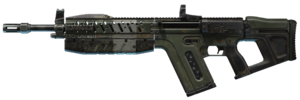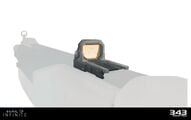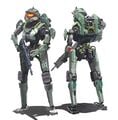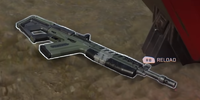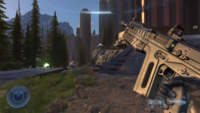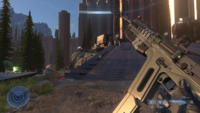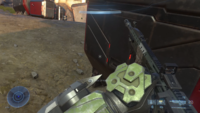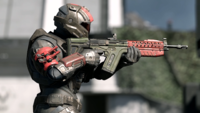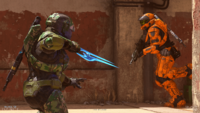VK78 Commando: Difference between revisions
From Halopedia, the Halo wiki
m (→Operational history: Link replacement, replaced: HMG-38 → HMG-38 heavy machine gun) |
BaconShelf (talk | contribs) mNo edit summary |
||
| Line 15: | Line 15: | ||
|height= | |height= | ||
|weight= | |weight= | ||
|ammotype=[[M259 6.5x48mm]]{{Ref/Book|Id=Enc22|Enc22|Page=169}}{{Ref/Generic|Id=HICGP|[[Halo Infinite]] [[Halo Infinite Campaign Gameplay Premiere|Campaign Gameplay Premiere]]}} | |ammotype=[[6.5x48mm|M259 6.5x48mm]]{{Ref/Book|Id=Enc22|Enc22|Page=169}}{{Ref/Generic|Id=HICGP|[[Halo Infinite]] [[Halo Infinite Campaign Gameplay Premiere|Campaign Gameplay Premiere]]}} | ||
|feed=20-round detachable box magazine{{Ref/Reuse|HICGP}} | |feed=20-round detachable box magazine{{Ref/Reuse|HICGP}} | ||
|operation= | |operation= | ||
Revision as of 15:30, May 19, 2022
| VK78 Commando | |
|---|---|
| Production overview | |
|
Manufacturer: |
|
| Specifications | |
|
Ammunition type: |
|
|
Feed system: |
20-round detachable box magazine[3] |
|
Fully-automatic[3] | |
| Service history | |
|
In service: |
|
The VK78 Commando is a weapon manufactured by Vakara GesmbH, in service with the United Nations Space Command.[3]
Overview
Specifications
The VK78 fires 6.5 mm rounds on automatic, and is fitted via rail-mounting with a recon sight-style optic that can magnify up to at least 2x. It is distinctive among human rifles in that it does not share the common bullpup configuration of weapons like the MA40 assault rifle and BR75 battle rifle, in which the magazine is inserted behind the trigger. Instead, the magazine well is located at an angle directly in front of the trigger guard.[3] The design of the weapon emphasizes ergonomics and reliability.[4] The VK78's charging handle is positioned on the left side of its body, just behind a side-mounted ammunition counter. Above the pistol grip is a fire selector dial, with two markings, the former of which is a row of red dots (presumably indicating fully-automatic) and the latter of which is a single white dot (potentially safe or semi-automatic). The weapon features numerous markings, including serial numbers, caliber specifications on the body and bolt carrier, and a small UNSC emblem atop a wedge-like protrusion in front of the top-mounted rail, behind the barrel. The VK78 used in 2560 features a matte black, grey and olive drab finish, with a prominent white strip across the weapon's front end.[3]
Operational history
VK78s were employed as early as 2495, during which time they were selected by the Colonial Military Authority to replace aging stocks of HMG-38 heavy machine guns in then-current service.[1] By 2560, the Commando was employed by UNSC Armed Forces personnel during the Installation 07 conflict.[5]
Gameplay
- Main article: Commando
The VK78 Commando is featured in Halo Infinite as an automatic tactical rifle, which deals kinetic damage. It is a precision weapon, meaning it is capable of inflicting headshots on unshielded targets, killing them instantly. Although automatic, it has a relatively slow rate of fire. The weapon has a single zoom level and is most effective at medium to long ranges, faltering in close quarters due to weaker aim assist than other weapons. It has significant recoil when fired consistently, which can make the weapon difficult to control and aim.[6]
Featured in both campaign and multiplayer, the Commando is a common weapon, being found frequently in weapon pads on multiplayer maps, or scattered around campaign levels. Ammo for the weapon is usually plentiful, as a result. It holds 20 rounds in its magazine in total.[6]
Variants
- Impact Commando: An improved version of the Commando with a mag increased from 20 to 40 and range is decreased from 2.0x to 1.4x.
Production notes
- The letters in its designation, VK78, may be a reference to its manufacturer, Vakara.
Gallery

|
Browse more images in this article's gallery page. |
Concept art
Screenshots and renders
A CQB-clad Spartan-IV wielding a VK78 in the A New Generation trailer.
A Zvezda-clad Spartan-IV with a VK78.
A Mark VII-clad Spartan sprinting with the VK78.
A Firefall-clad Spartan holding a VK78.
List of appearances
- Halo Infinite (First appearance)
Sources
- ^ a b Halo Waypoint, Canon Fodder - Showcase Sensitive (Retrieved on Jun 16, 2021) [archive]
- ^ Halo Encyclopedia (2022 edition), page 169
- ^ a b c d e f Halo Infinite Campaign Gameplay Premiere
- ^ Xbox Wire, Bank Now, Play Later: Halo Infinite Meets Monster Energy Global Partnership (Retrieved on Aug 31, 2020) [archive]
- ^ Halo Infinite
- ^ a b Halo Infinite, weapon: VK78 Commando
| ||||||||||||||||||||||||||||||||||||||||||||||||||
